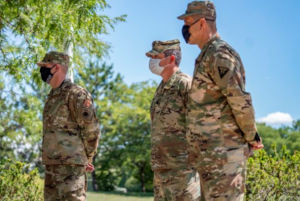VT Air National Guard to train in Wisconsin despite rising Covid-19 cases

COLCHESTER— The Vermont Air National Guard is moving ahead with plans to send 250 airmen to Wisconsin to train in early August despite a “spike” in Covid-19 cases and deaths in the midwestern state.
Col. David Shevchik, commander of the 158 Fighter Wing, announced Friday at a press conference that, with risk mitigation measures in place, 250 Vermont Air National Guard members will travel to Volk Field Air National Guard Base in Camp Douglas, Wisconsin, to participate in a training mission called “Northern Lightning.”
Additionally, at the press conference, VNG leaders gave overviews as to where nearly 1,000 Army National Guard and 70 Air National Guard troops were going to be deployed, starting in October.
Of those deploying, 350 soldiers from 3 Battalion of the 172 Infantry will head to U.S. Central Command, which stretches from the Middle East into Asia, to support Operation Spartan Shield, said Lt. Col. Matt Wignall, the commander of the unit.
“Make no mistake, we’re deploying to a combat zone,” Wignall said. “It’s absolutely a mission we’re prepared for.”
Also, starting in October, 70 airmen from the Vermont Air National Guard will deploy to the U.S. Air Force’s Africa, Europe and Central Command areas to support expeditionary and combat operations, Col. Shevchik said.
Concerning the upcoming training in Wisconsin, Col. Shevchik told the gathered reporters: “As you can imagine, executing on this training mission during a pandemic requires a bit of extra planning.” He added, “We will follow DoD, CDC, Vermont Department of Health and Wisconsin Department of Health Services guidance and use strict risk mitigation measures to ensure the safety and well being of our airmen, their families and communities.”
In the past two weeks, the average number of daily new cases in Wisconsin has increased by 11% and has started spreading into more rural areas that previously had not been hit as hard by the virus, according to state data.
As of Jul. 31, Wisconsin’s health department showed that in the last week the state saw 6,023 people test positive, while 56 people died from Covid-19.
In total, Wisconsin has had at least 52,000 confirmed cases of Covid-19 and 919 deaths from the disease since the pandemic started.
In Vermont, Shevchik said he receives updates every week on the situation in Wisconsin and consults with medical professionals, and he feels that the appropriate mitigations efforts are in place. But he added the training could be canceled at the last minute if things change.
“We need to do this, to go and meet our readiness and training requirements, and meet our timeline. So we’re going to do that,” he said. “And we have to balance that risk with the mission needs. And I think the team’s done that very well, both in Wisconsin and Vermont.”
Shevchik said to his knowledge the two counties around Volk Field — Juneau and Monroe Counties — have had relatively low Covid-19 case numbers.
But, as of Jul. 31, Wisconsin health officials have placed both those counties in the “high” category with this past week’s Covid-19 activity, according to state data.
The state ranks each county in one of four categories ranging from low to high “burden,” meaning the number of cases per 100,000 residents. In Juneau alone, in the last two weeks, the case rate is 2,000 per 1 million state data shows.
In Vermont, most counties remain under 200 cases per million residents. Chittenden County has the highest rate at 303 active cases per million.
Shevchik said mitigation efforts to prevent the spread of Covid-19 include restricting the 250 airmen to the base and dividing them up by units, which they will remain in for the duration of the two weeks.
Vermont airmen will not be tested before their departure, but the National Guard is following all CDC and Department of Defense guidelines, he said.
“What I do want to make sure that we continue to emphasize is the reintegration planning factor to make sure that we’re safe, there in Wisconsin, but then when we bring the team back here to Vermont,” Shevchik said. “And we’re looking at different options to make sure of that.”
Ultimately, Shevchik said, he and others in command are “committed” to the health and safety of their airman, but have to balance concerns with meeting readiness requirements.
The airmen will be participating in Northern Lightning, which lasts two weeks, and is one of seven Air National Guard joint accredited exercises held at a Combat Readiness Training Center. Shevchik said the training will provide the Vermont airmen real-world, combat-based training on a “tactical level.”
Specifically, the training is meant to prepare airmen for combat with countries like China and Russia which have similar aircraft and surface to air anti-aircraft weapons as the U.S, said Capt. Mike Arcovitch, a spokesperson for the Vermont National Guard.
“The focus is on being able to operate against your ‘near peers’ in a contested environment meaning, like in Iraq, right now it;s not a contested environment because there’s no real threat to our aircraft,” he said. “But in a different environment, we would not quote-unquote ‘own the airspace’. It’s been a long time since the Air Force has operated in a contested environment and so, they need to continue to train for those conditions.”
The airmen are slated to be gone from Aug. 8-20.
